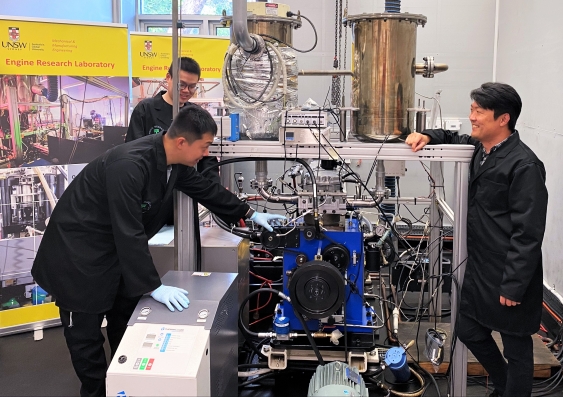
Diesel engine converted to run on 90% hydrogen with 26% more efficiency

A team of Australian engineers has successfully converted a diesel engine to run as a hydrogen-diesel hybrid engine, with 90% hydrogen as fuel.
According to the engineers at the University of New South Wales (UNSW) Sydney, this hybrid engine reduces CO2 emissions by more than 85% in the process.
The team, led by Professor Shawn Kook from the School of Mechanical and Manufacturing Engineering, spent around 18 months developing the Hydrogen-Diesel Direct Injection Dual-Fuel System that means existing diesel engines can run using 90% hydrogen as fuel, UNSW said in a statement.
Also read: Green fuel will replace petrol in next five years, says Gadkari
The researchers said that any diesel engine used in trucks and power equipment in the transportation, agriculture, and mining industries could ultimately be retrofitted to the new hybrid system in just a couple of months.
Green hydrogen, which is produced using clean renewable energy sources such as wind and solar, is much more environmentally friendly than diesel.
In a paper published in the International Journal of Hydrogen Energy, Prof. Kook’s team showed that using their patented hydrogen injection system reduces CO2 emissions to just 90 g/kWh – 85.9% below the amount produced by the diesel-powered engine.
Podcast: Hydrogen fuel cell cars: What the future holds
“Up to 90% hydrogen energy fraction was achieved in a hydrogen diesel dual-fuel direct injection (H2DDI) light-duty single-cylinder compression ignition engine. An automotive-size inline single-cylinder diesel engine was modified to install an additional hydrogen direct injector. The engine was operated at a constant speed of 2,000 revolutions per minute,” the paper said.
“This new technology significantly reduces CO2 emissions from existing diesel engines, so it could play a big part in making our carbon footprint much smaller, especially in Australia with all our mining, agriculture and other heavy industries where diesel engines are widely used,” said Prof. Kook.
“We have shown that we can take those existing diesel engines and convert them into cleaner engines that burn hydrogen fuel. Being able to retrofit diesel engines that are already out there is much quicker than waiting for the development of completely new fuel cell systems that might not be commercially available at a larger scale for at least a decade.
Also read: Adani and TotalEnergies to create world’s largest green hydrogen ecosystem
“With the problem of carbon emissions and climate change, we need some more immediate solutions to deal with the issue of these many diesel engines currently in use.”
High-pressure hydrogen direct injection
The UNSW team’s solution to the problem maintains the original diesel injection into the engine, but adds a hydrogen fuel injection directly into the cylinder.
Importantly, the new Hydrogen-Diesel Direct Injection Dual-Fuel System does not require extremely high-purity hydrogen which must be used in alternative hydrogen fuel cell systems and is more expensive to produce. And compared to existing diesel engines, an efficiency improvement of more than 26% has been shown in the diesel-hydrogen hybrid, the team said.
That improved efficiency is achieved by independent control of hydrogen direct injection timing, as well as diesel injection timing, enabling full control of combustion modes – premixed or mixing-controlled hydrogen combustion.
The research team hopes to be able to commercialise the new system in the next 12 to 24 months and are keen to consult with prospective investors.
Also read: IISc scientists develop new tech for making green hydrogen from biomass
They say the most immediate potential use for the new technology is in industrial locations where permanent hydrogen fuel supply lines are already in place.
That includes mining sites, where studies have shown that about 30% of greenhouse-gas emissions are caused by the use of diesel engines, largely in mining vehicles and power generators.
Hydrogen-powered car
In March, Union minister for road transport and highways, Nitin Gadkari arrived at Parliament House in New Delhi in a hydrogen-powered car. The same month, he had launched India’s first green hydrogen-based advanced fuel cell electric vehicle (FCEV), Toyota Mirai.
“Today, we can run a car by separating hydrogen from water. I myself use a car that runs on hydrogen fuel, and it doesn’t make any noise or emanate smoke,” he had said in May.
Union Minister Shri @nitin_gadkari ji visited Parliament House by Hydrogen based Fuel Cell Electric Vehicle (FCEV) today. Demonstrating the car powered by ‘Green Hydrogen’, Shri Gadkari ji emphasised the need to spread awareness about Hydrogen, FCEV technology… pic.twitter.com/NNHewczvpc
— Office Of Nitin Gadkari (@OfficeOfNG) March 30, 2022

